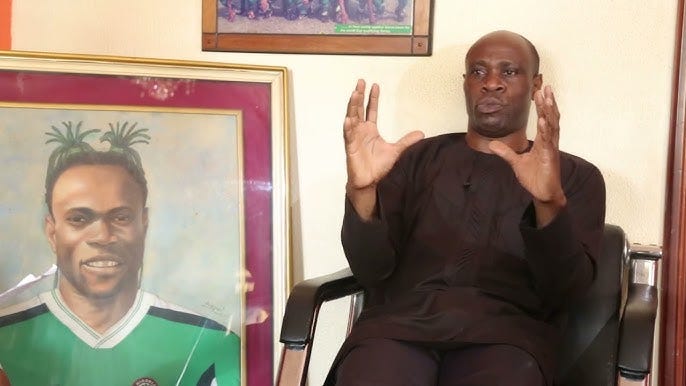The Real Question Behind Taribo West’s Outburst
The Real Question Behind Taribo West’s Outburst

Two days ago, when Taribo West erupted in anger over the death of Peter Rufai and the silence of the Nigerian Football Federation, his words carried the weight of grief. He asked why Lagos State and the NFF left the burden of funeral expenses on Rufai’s family.
“It’s disheartening that you have Lagos State, you have the Nigerian Football Association. They drop the bulk (sic) on the family.”
His voice shook with passion. His rage was genuine. Yet beneath his outburst lies a question that has been avoided for far too long. Should the Nigerian state, or any government body, be financially responsible for the funerals and medical treatments of former athletes?
That question sounds simple, but it is anything but. If the government begins footing the bills for ex-footballers, what stops former weightlifters, sprinters, wrestlers, and basketball players from demanding the same? Do we say yes to football because it draws crowds and money, and tell the javelin thrower or table tennis champion that their sacrifice matters less? Once you pull on that thread, the entire system of fairness begins to unravel.
And why stop with sports? What about the academics who have carried Nigeria’s name into Nobel-level research? What about the entrepreneurs who built companies that employed thousands? What about musicians, artists, actors, or scientists? Are footballers more deserving of state-sponsored burials than Michael Taiwo Akinkunmi, the designer of the Nigerian flag? A civil servant who labored for 35 years without fame and left behind a modest pension might wonder why an international footballer’s family should expect state coverage for something as basic as a funeral.
The uncomfortable truth is this: the real issue is not state neglect. It is the financial vulnerability of many athletes who once earned vast sums but retire into struggle. Peter Rufai, like many of his contemporaries, played at the highest level. He kept goal for Nigeria, competed in two World Cups, and spent years in European leagues where salaries were far higher than what most Nigerians can imagine. He should have had enough resources to live out his days without his family scrambling to bury him. Why did that not happen?
The pattern is not unique to Nigeria. We have seen global cautionary tales. Boxing has produced champions who once earned millions but died broke, forgotten by promoters and fans. A study revealed that nearly 60% of NBA players go broke within five years of retiring. The NFL has similar figures. Athletes, often at their peak in their twenties, are rarely trained to think long-term. They earn large sums, but careers are short, injuries end opportunities, and extravagant lifestyles consume wealth faster than it accumulates.
The difference is that in other countries, conversations about financial planning and life insurance are unavoidable. In the United States, insurance companies openly sell policies where athletes can lock in funeral expenses decades ahead, leaving their families not only free from debt but sometimes with an inheritance. Serena Williams invested heavily in startups and now makes more from her portfolio than she ever earned on the court. Michael Jordan, despite being retired for two decades, is worth over $3 billion thanks to ownership stakes and shrewd deals. Forbes has him as the 7th richest black man in the world.
Closer to home, Obafemi Martins invested widely and avoided the fate of his predecessors. Nwankwo Kanu launched the Kanu Heart Foundation and built both reputation and financial safety nets that outlived his playing career. These are exceptions, not the rule. They prove that financial security is possible for Nigerian footballers. They also show that discipline and foresight matter more than applause and medals.
So when Taribo West rages, perhaps he is aiming at the wrong target. The outrage should not be about whether Nigeria pays for a funeral. The outrage should be about why so many of our heroes, despite once commanding wealth that dwarfs the salaries of professors, doctors, or civil servants, end their lives in poverty. It is a failure of financial literacy. It is a culture that prizes display over prudence. It is a football ecosystem that does little to prepare players for the reality that fame fades.
This is where former players like Taribo himself can make the biggest difference. Instead of demanding perpetual financial responsibility from the government, he could lead a campaign to teach younger players how to invest, how to save, and how to plan for a time when the stadium no longer roars their name. The Nigerian Football Federation could make financial training compulsory for national team call-ups. Clubs could build partnerships with insurance companies to offer affordable policies. It will not solve every problem, but it will stop the cycle of players dying broke while families beg for support.
Rufai was a legend. He deserved respect and remembrance. What he did not deserve was to leave this world with his family in despair over something as ordinary as funeral costs. The lesson from his passing is not that the government should bankroll death. The lesson is that athletes who command extraordinary incomes must prepare for the ordinary realities of life.
According to Taribo, “With this kind of example, I will never advise even my son to put his feet for this country.”
Taribo’s anger is a symptom of a deeper problem. The solution is not charity from Abuja or Lagos. The solution is prudence and planning. If Nigerian football wants to honor Rufai and others like him, the greatest tribute would be to ensure the next generation of players never repeat this story.

